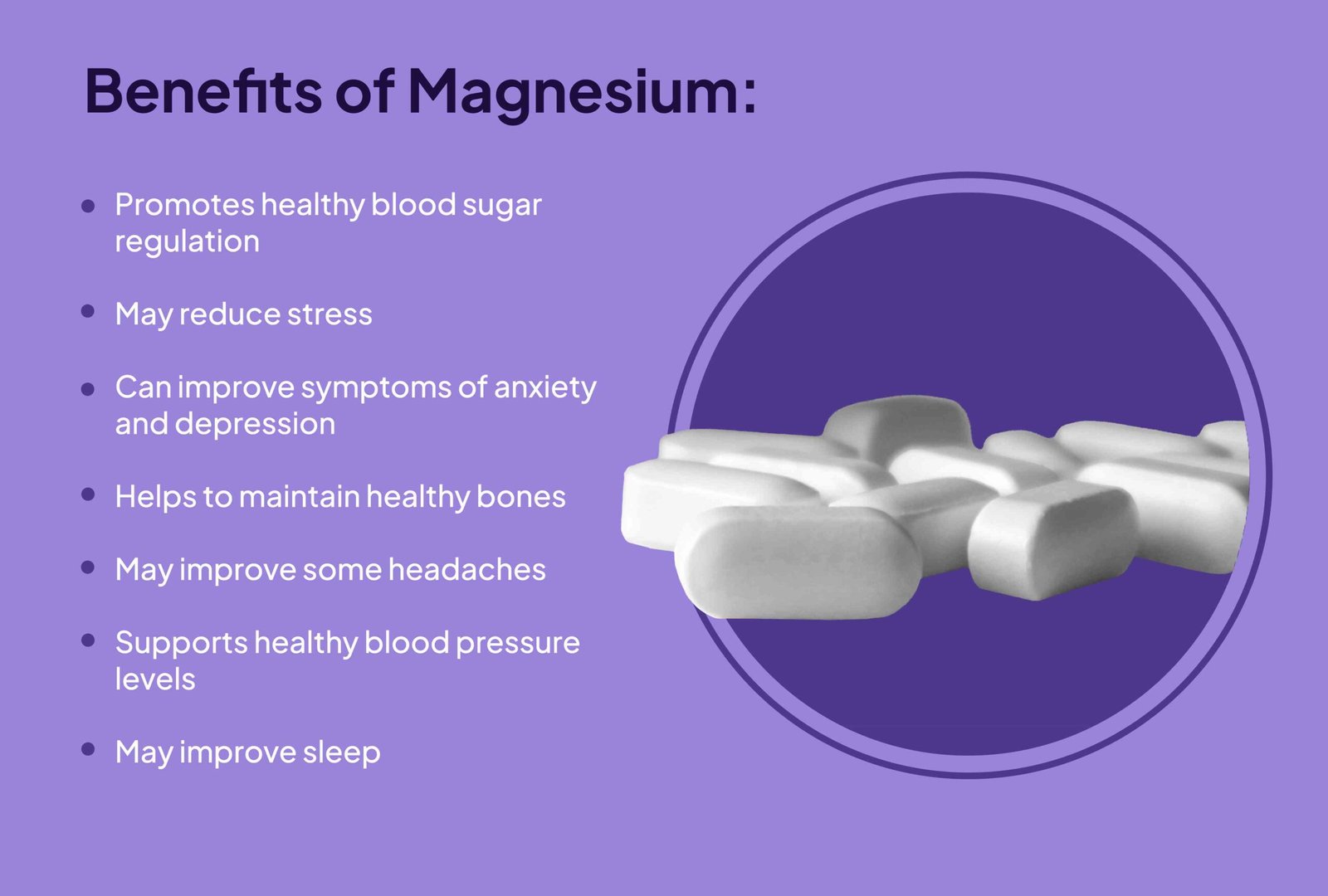Understanding Magnesium’s Role in Your Body
Magnesium is an essential mineral involved in over 300 enzymatic reactions in the body. What most people don’t realize—and this is important—is that it’s crucial for everything from muscle and nerve function to blood sugar control and blood pressure regulation. It’s also vital for energy production, protein synthesis, and bone health. In essence, magnesium is a workhorse mineral that keeps many of our body’s systems running smoothly.
- Muscle and Nerve Function: Magnesium helps regulate muscle contractions and nerve impulses.
- Blood Sugar Control: It plays a role in insulin sensitivity and glucose metabolism.
- Blood Pressure Regulation: Magnesium helps maintain healthy blood vessel function.
- Energy Production: It’s involved in the creation of ATP, the body’s primary energy currency.
- Bone Health: Magnesium is a key component of bone structure.
The Pathophysiology Behind Magnesium Deficiency
The pathophysiology behind this is quite fascinating. Magnesium deficiency, also known as hypomagnesemia, can arise from several factors. Inadequate dietary intake is a common culprit, particularly with the prevalence of processed foods that are often low in magnesium. However, even with a healthy diet, certain conditions can impair magnesium absorption. These include gastrointestinal disorders like Crohn’s disease and celiac disease. Kidney problems can also lead to increased magnesium excretion in the urine. Certain medications, such as diuretics and proton pump inhibitors (PPIs), can also contribute to magnesium depletion. As we age, our kidneys become less efficient at retaining magnesium, making older adults more susceptible to deficiency.
Recognizing the Signs and Symptoms of Magnesium Deficiency
It’s completely normal to feel concerned about whether you’re getting enough magnesium, especially given how common deficiency can be. The symptoms can be varied and sometimes subtle, making it tricky to diagnose based on symptoms alone.
Here are some common signs and symptoms to watch out for:
- Muscle Cramps and Spasms: This is one of the most well-known symptoms.
- Fatigue and Weakness: Low magnesium levels can impact energy production.
- Irregular Heartbeat: Magnesium plays a role in maintaining a steady heart rhythm.
- Numbness and Tingling: Nerve function can be affected by magnesium deficiency.
- Headaches: Some studies have linked low magnesium to migraines.
- Anxiety and Depression: Magnesium influences neurotransmitter function.
When to Seek Medical Attention for Suspected Magnesium Deficiency
While mild magnesium deficiency may not require immediate medical attention, it’s important to seek professional help if you experience severe symptoms or if you have underlying health conditions that could be contributing to the deficiency. If you’re experiencing persistent muscle cramps, irregular heartbeat, or neurological symptoms like numbness or seizures, it’s crucial to consult a doctor. Also, if you’re taking medications that are known to deplete magnesium, it’s a good idea to have your levels checked regularly.
Diagnostic Approaches and Tests for Magnesium Levels
Diagnosing magnesium deficiency can be challenging because standard serum magnesium tests may not always accurately reflect the body’s total magnesium stores. Serum magnesium only represents a small percentage of the magnesium in the body, with most of it stored in bones, muscles, and other tissues.
Here are some diagnostic approaches I use in my clinic:
- Serum Magnesium Test: This is the most common test, but it can be misleading.
- Red Blood Cell (RBC) Magnesium Test: This test measures magnesium levels inside red blood cells, providing a more accurate assessment.
- Magnesium Tolerance Test: This test involves administering magnesium intravenously and measuring how much is excreted in the urine. It can help assess magnesium retention.
- Clinical Evaluation: A thorough medical history and physical exam are essential for identifying potential causes and risk factors for magnesium deficiency.
Treatment Options for Magnesium Deficiency: From Conservative to Advanced
The treatment for magnesium deficiency depends on the severity of the deficiency and the underlying cause. In most cases, increasing dietary intake of magnesium-rich foods or taking magnesium supplements is sufficient. However, in severe cases, intravenous magnesium may be necessary.
- Dietary Modifications: Emphasize magnesium-rich foods like leafy green vegetables, nuts, seeds, and whole grains.
- Oral Magnesium Supplements: There are various forms of magnesium supplements available, such as magnesium oxide, magnesium citrate, and magnesium glycinate. Magnesium glycinate is often better tolerated and absorbed.
- Intravenous Magnesium: This is reserved for severe deficiencies or when oral supplementation is not feasible.
- Addressing Underlying Causes: If the deficiency is caused by an underlying medical condition or medication, it’s important to address those issues as well.
Recovery Expectations and Timeline for Replenishing Magnesium
The time it takes to recover from magnesium deficiency varies depending on the severity of the deficiency and the individual’s response to treatment. In general, it may take several weeks to months to fully replenish magnesium stores. It’s important to work with your doctor to monitor your magnesium levels and adjust your treatment plan as needed.
Prevention Strategies and Lifestyle Modifications to Maintain Healthy Magnesium Levels
Preventing magnesium deficiency is often easier than treating it. Here are some strategies to incorporate into your daily life:
- Eat a Balanced Diet: Focus on consuming a variety of magnesium-rich foods.
- Limit Processed Foods: Processed foods are often low in magnesium and high in sodium, which can increase magnesium excretion.
- Stay Hydrated: Adequate hydration is important for magnesium absorption and retention.
- Manage Stress: Chronic stress can deplete magnesium levels. Practice stress-reducing techniques like yoga, meditation, or deep breathing exercises.
- Be Mindful of Medications: If you’re taking medications that can deplete magnesium, talk to your doctor about monitoring your levels and potentially adjusting your medication regimen.
Long-Term Management and Monitoring of Magnesium Levels
For individuals at high risk of magnesium deficiency, such as those with gastrointestinal disorders, kidney problems, or those taking certain medications, long-term management and monitoring are essential. Regular blood tests can help track magnesium levels and ensure that treatment is effective. It’s also important to address any underlying health conditions that could be contributing to the deficiency.
Patient Education Points and Resources for Further Learning
I believe that patient education is crucial for empowering individuals to take control of their health. Here are some key points to remember about magnesium:
- Magnesium is essential for hundreds of bodily functions.
- Magnesium deficiency is common and can cause a variety of symptoms.
- Diagnosis can be challenging, but blood tests and clinical evaluation can help.
- Treatment involves dietary modifications, oral supplements, or intravenous magnesium.
- Prevention is key, focusing on a balanced diet and healthy lifestyle habits.
For further learning, I recommend checking out the National Institutes of Health (NIH) Office of Dietary Supplements website, which provides comprehensive information about magnesium and other nutrients.

Clinical Vignette: A Case of Unexplained Fatigue
In my years of clinical practice, I’ve discovered that seemingly unrelated symptoms can sometimes be traced back to a simple deficiency. I recall a patient, Sarah, a 45-year-old woman who presented with persistent fatigue and muscle cramps. She had undergone numerous tests, and everything came back normal. She was understandably frustrated and concerned. After a thorough review of her medical history, I discovered that she had been taking a PPI for heartburn for several years. Based on current medical evidence, I knew that PPIs could interfere with magnesium absorption. I ordered an RBC magnesium test, which revealed a significant deficiency. We discontinued the PPI (after discussing alternative strategies for her heartburn) and started her on a magnesium glycinate supplement. Within a few weeks, her fatigue and muscle cramps began to improve, and she eventually regained her energy levels. This case highlights the importance of considering magnesium deficiency, especially in patients taking medications that can affect its absorption.
Magnesium-Rich Foods: A Dietary Guide
Incorporating magnesium-rich foods into your diet is a simple and effective way to boost your magnesium levels. Here’s a guide to some of the best sources:
- Leafy Green Vegetables: Spinach, kale, and collard greens are excellent sources of magnesium.
- Nuts and Seeds: Almonds, cashews, pumpkin seeds, and flaxseeds are packed with magnesium.
- Whole Grains: Brown rice, quinoa, and oats are good sources of magnesium.
- Legumes: Black beans, kidney beans, and lentils are rich in magnesium.
- Avocados: This creamy fruit is a delicious source of magnesium.
- Dark Chocolate: Indulge in a square or two of dark chocolate for a magnesium boost.
Magnesium Supplementation: Choosing the Right Form
If you’re considering taking a magnesium supplement, it’s important to choose the right form. Not all magnesium supplements are created equal. Some forms are better absorbed and tolerated than others.
Here’s a breakdown of some common magnesium supplements:
- Magnesium Oxide: This is a common and inexpensive form, but it’s poorly absorbed.
- Magnesium Citrate: This form is better absorbed than magnesium oxide and has a mild laxative effect.
- Magnesium Glycinate: This is a well-absorbed form that is gentle on the stomach.
- Magnesium Chloride: This form is easily absorbed and can be applied topically.
- Magnesium Sulfate (Epsom Salts): This is commonly used in bath salts for muscle relaxation.
- Magnesium L-Threonate: Some studies suggest this form may have cognitive benefits.
Potential Drug Interactions with Magnesium
Magnesium can interact with certain medications, so it’s important to be aware of potential drug interactions before taking magnesium supplements.
Here are some medications that can interact with magnesium:
- Antibiotics: Magnesium can interfere with the absorption of certain antibiotics, such as tetracyclines and quinolones.
- Bisphosphonates: Magnesium can reduce the absorption of bisphosphonates, which are used to treat osteoporosis.
- Diuretics: Some diuretics can increase magnesium excretion, leading to deficiency.
- Proton Pump Inhibitors (PPIs): Long-term use of PPIs can interfere with magnesium absorption.
If you’re taking any of these medications, talk to your doctor before taking magnesium supplements.
Magnesium and Exercise: Enhancing Performance and Recovery
Magnesium plays a crucial role in muscle function and energy production, making it an important nutrient for athletes and active individuals. It helps regulate muscle contractions, nerve impulses, and electrolyte balance. During exercise, magnesium is lost through sweat, which can lead to deficiency and impaired performance.
Supplementing with magnesium may help improve exercise performance, reduce muscle cramps, and speed up recovery. It’s also important to stay hydrated and consume a balanced diet to replenish magnesium stores.
Magnesium for Skin Health: Exploring the Benefits
While magnesium is primarily known for its internal health benefits, it also plays a role in skin health. Magnesium helps regulate inflammation, protect against free radical damage, and promote wound healing. It’s also involved in the production of collagen, which is essential for maintaining skin elasticity and firmness. Topical magnesium, such as magnesium oil or Epsom salt baths, can help soothe irritated skin, reduce inflammation, and improve skin hydration. For optimal skin hydration, remember that dietary intake and topical applications work together.
Magnesium’s Impact on Sleep Quality
Many of my patients struggle with sleep issues, and magnesium is often a part of the conversation. Magnesium helps regulate the sleep-wake cycle by influencing the production of melatonin, a hormone that promotes sleepiness. It also helps calm the nervous system and reduce anxiety, which can interfere with sleep. Supplementing with magnesium may help improve sleep quality, reduce insomnia, and promote relaxation.
As we consider ways to improve sleep, it’s also worth noting how the timing of melatonin release is impacted by light exposure.
Magnesium and Bone Health: Building Strong Bones
Magnesium is a key component of bone structure and plays a vital role in maintaining bone density. It helps regulate calcium absorption and utilization, which are essential for bone health. Magnesium deficiency can increase the risk of osteoporosis and fractures.
Consuming a diet rich in magnesium and other bone-building nutrients, such as calcium and vitamin D, is crucial for maintaining strong bones throughout life.
Magnesium and Cardiovascular Health: Protecting Your Heart
Magnesium plays a crucial role in maintaining cardiovascular health. It helps regulate blood pressure, heart rhythm, and blood vessel function. Magnesium deficiency has been linked to an increased risk of hypertension, heart disease, and stroke.
Supplementing with magnesium may help lower blood pressure, improve cholesterol levels, and reduce the risk of cardiovascular events. It’s important to talk to your doctor before taking magnesium supplements, especially if you have a heart condition or are taking medications for heart disease.
Magnesium in Pregnancy: Supporting Maternal and Fetal Health
Magnesium is essential for both maternal and fetal health during pregnancy. It helps support healthy bone development, nerve function, and muscle function in the developing fetus. Magnesium deficiency during pregnancy has been linked to an increased risk of preterm labor, preeclampsia, and other complications.
Pregnant women should ensure they are getting enough magnesium through diet or supplementation, as recommended by their healthcare provider.
Magnesium and Diabetes: Improving Blood Sugar Control
Magnesium plays a role in insulin sensitivity and glucose metabolism, making it an important nutrient for people with diabetes. Magnesium deficiency has been linked to insulin resistance and impaired blood sugar control.
Supplementing with magnesium may help improve insulin sensitivity, lower blood sugar levels, and reduce the risk of diabetes complications. It’s important to monitor blood sugar levels closely and work with your doctor to adjust your diabetes management plan as needed.
Comparing Magnesium Supplement Types
| Magnesium Type | Absorption Rate | Common Uses | Potential Side Effects |
|---|---|---|---|
| Magnesium Oxide | Low | Short-term relief of constipation and heartburn | Diarrhea, stomach upset |
| Magnesium Citrate | Medium | Constipation relief, general magnesium supplementation | Diarrhea, stomach cramps |
| Magnesium Glycinate | High | General magnesium supplementation, sleep support, muscle relaxation | Generally well-tolerated, may cause mild stomach upset in some individuals |
| Magnesium Chloride | High | Topical use for muscle soreness, general magnesium supplementation | Skin irritation (topical), diarrhea (oral) |
Frequently Asked Questions
When to Call Your Doctor About Magnesium Concerns
While this guide provides general information about magnesium, it’s not a substitute for professional medical advice. It’s important to talk to your doctor if you have any concerns about your magnesium levels or if you’re experiencing symptoms of magnesium deficiency. Your doctor can evaluate your individual needs and recommend the best course of action.
In summary, magnesium is a vital mineral for overall health. By understanding its role in the body, recognizing the signs of deficiency, and taking steps to ensure adequate intake, you can support your health and well-being.
Remember, maintaining healthy skin involves a multifaceted approach, and understanding the nuances of exfoliation tailored to your specific skin type is also crucial.
Also, remember that maintaining adequate hydration is critical for healthy skin and overall well-being; consider the strategies discussed regarding hydration for healthy skin.
Finally, remember that the information provided here is for educational purposes only and should not be considered medical advice. Always consult with a qualified healthcare professional for any health concerns or before making any decisions related to your health or treatment.
Medical Disclaimer: This article is intended for informational purposes only and does not constitute medical advice. Always consult with a qualified healthcare professional for diagnosis and treatment of medical conditions.
Important Medical Disclaimer
The information provided in this article is for educational purposes only and is not intended to be a substitute for professional medical advice, diagnosis, or treatment. Always seek the advice of your physician or other qualified health provider with any questions you may have regarding a medical condition.
Never disregard professional medical advice or delay in seeking it because of something you have read on this website.



